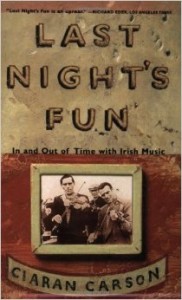Chuck Lipsig penned this review.
Ciaran Carson is an Irish poet and musician, who has, in Last Night’s Fun, put together a series of writings, each inspired by a traditional tune. In most cases, these are short essays. For others, he has written poetry or put together sets of quotations. Occasionally the subjects in consecutive chapters are directly related, but that is most likely happenstance.
The inspiration may be obvious. For example, the section named “Boil the Breakfast Early” inspires and essay on — what else? — breakfast; “Humours of Whiskey” is about drink in general and whiskey in particular. For some, the connection is only clear with a bit of thought. For example,”Hard to Fill” is about flute playing.”The Steampacket” only eventually gets to a comparison of the meandering of Irish tunes and the meandering of the Mississippi River that provides the connection between title and text.
Some of the essays donít manage to stay on topic, wandering from subject to subject, as each idea inspires a new, tangential subject. Which is not to say this is a disorganized book or that Carson is a scattershot, nor scatterbrained, writer. Rather, it’s like when an Irish (or other traditional) musician plays a set, starting with one tune, then stringing several more together, into a whole.
There is a very delicate balance. It would be very easy for Carson to have lost control of his writing, but by coming back time and again to certain topics, he keeps the book together. Among these regular subjects, are music (of course), food, drink, sports, and travel. Carson is also fascinated with time and how it is experienced.
It’s hard to choose just a few high points. One that stands out in the title essay, “Last Night’s Fun” is about concert recording in which is caught “a snippet of conversation just off-mike, or just-on, a girl’ s Galway accent going, “I haven’t seen him dancing in years. [Sic] You have to put your ear to the speaker again and again, rewinding and pressing pla over and over just to get the fragment, this isolated phrase in time.” This is a hauntingly lovely passage and, like the author, I found myself wondering about the story behind the snippet of conversation.
Other great moments include “The Dairy Maid” which inspires Carson to recite a poem — you can almost hear this being spoken — about a girl who is hired at a hiring fair by a man who insists on using the most outlandish vocabulary. “Hard to Fill” includes a highly detailed portrait and inventory of the workshop of a flute repairer. Carson’s description of the efforts of a running back in American football, which appears to be the author’s second favorite sport after the Irish sport of hurling, in “The Hurler on the Ditch” is fascinating for the perspective of a non-American who is familiar with the gridiron. His verbal transformation of a bus into Finn McCool’s accordion in “Off the Bus” is skillful and funny.
There are a few problems here and there. Carson can get pretentious, especially in the occasional passage when he writes about chaos theory or the 60s. It might have been nice if the brief biography of Chief Francis O’Neill, compiler of O’Neill’s Music of Ireland, had been more in Carson’s words; but the three-page excerpt from the 1898 book, The Biographical History of the American Irish in Chicago is excellent. (See our review of the revised edition of O’Neill’s Music of Ireland.)
But these are quibbles in an excellent book. Carson is a talented writer, with a gift for lengthy, intricate, and enthralling descriptions that create images clearer than many a painter is capable of. This is a book as enchanting as the music that inspired it.
(North Point Press, 1996)
[

